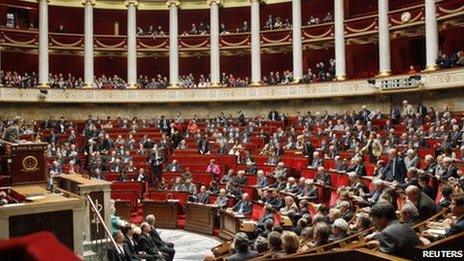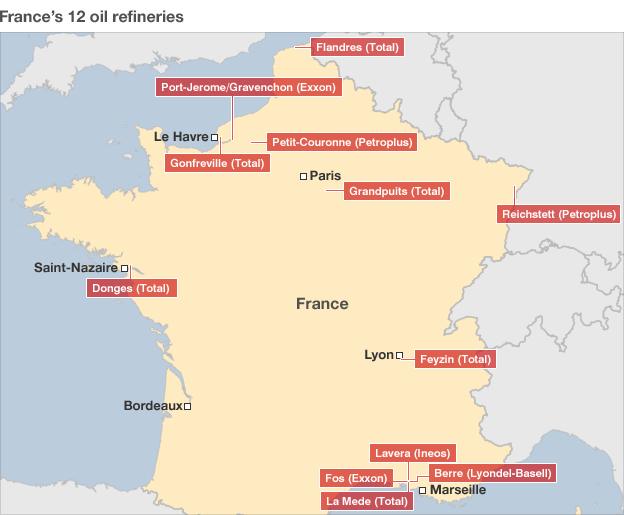French MPs adopt pension reform
- Published

The bill has now cleared all of its legislative hurdles
France's National Assembly has voted to raise the pension age by two years after weeks of industrial action across the country.
The bill still faces a legal challenge before President Nicolas Sarkozy can sign it off next month.
While the protest movement has lost steam, a new day of action has been declared for Thursday.
Aviation officials predict half of flights at Paris Orly airport will be cancelled and 30% at other airports.
Union leaders say they will also pursue the protest in other ways.
Mr Sarkozy is hoping that Wednesday's vote will extinguish any further appetite for confrontation, the BBC's Christian Fraser reports from Paris.
It is expected that he will be in a position to sign off the bill, which raises the minimum retirement age from 60 to 62, by the middle of November.
Opinion polls suggest that Mr Sarkozy's approval ratings have plummeted to record lows of below 30%, 18 months before the next presidential election.
An Ifop poll taken last week also suggested that 59% of French people opposed the blockade of refineries, road junctions and companies by strikers.
Final skirmishes
The National Assembly, France's lower house, voted through the bill on Wednesday afternoon by 336 votes for to 233 against.
The upper house, the Senate, backed the bill by 177 votes to 151 on Tuesday.
Prime Minister Francois Fillon sought to draw a line under the protests, urging opponents to respect the will of parliament.
"It was right to have a vigorous debate but the law of the Republic should henceforth be respected by all," he said in a statement.
Jean-Luc Hacquart, a representative of the CGT union in Paris, said he opposed the pension reform because it was "unfair".
"I don't want to work until I'm 67 years old and I don't what my son to be unemployed," he said, speaking at the Grandpuits oil refinery.
"That's why I'm here. It is not legitimate. They do what they want. We knew that this bill would be approved but democracy is not carte blanche given to people who do what they want in-between each election."
Some disruption as a result of strike action continued on Wednesday morning:
Delivery of refined oil from seven out of France's 12 refineries remained blocked ahead of votes by staff on whether to call the strike off, unions told Reuters news agency
About 250 people blocked an incinerator at Fos-sur-Mer, near Marseille, despite the decision of rubbish collectors on Tuesday to call off a two-week strike which had left the city strewn with 10,000 tonnes of refuse
About 80 people blocked a bus depot in Tours for the second time this week
Our correspondent says the last skirmishes of this battle will still be dangerous both to the government and the economy.
Students tried to rekindle the protests on Tuesday but only about 1,000 attended the main demonstration outside the Senate.
Thursday will mark the ninth day of nationwide action, AFP news agency reports, with calls for strikes and protest marches in more than 100 towns and cities. Another day of action is planned for 6 November.
However, Finance Minister Christine Lagarde said on Tuesday that the situation had reached a "turning point".
"What's very important is taking responsibility - it's realising that the economy needs to function," she said.
